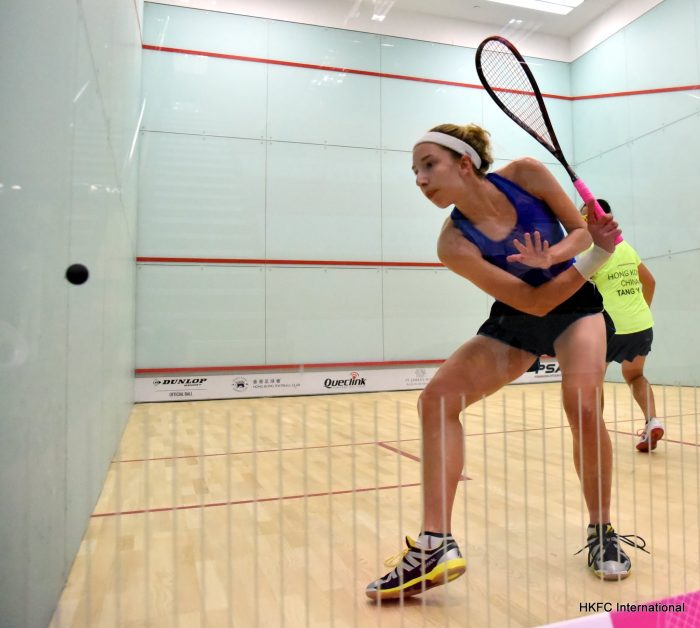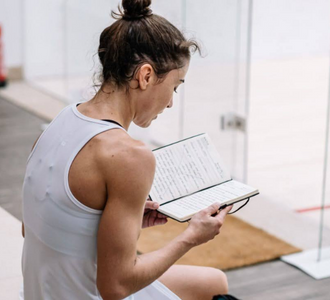Often when I ask players what their strengths are, or what type of game they want to play, a glazed and blank look comes over their faces.
I also get asked the question, “How do I figure out what my game is?”
Even some of the better players I have come across struggle to know and understand what type of game of squash to play.
My hope would be by the end of this blog to arm you with tools about how to discover your game of squash and to thoroughly enjoy the process of this exploration.
Personality
Your game of squash needs to be based on your individual personality. Some players are very meticulous with lots of attention to detail involving a lot of structure. Other players like the more freestyle approach and feel their way around the court and in the game. Others are somewhere in the middle.
You should think about when you have played your best and what type of style this is and does it align with your personality? This can often be a hard and challenging question but one I would encourage to keep asking and getting into detail with. The answer is unlikely to come right away, but after plenty of times reflecting.
When trying to discover this you should try and use FUN as a guiding force. What do you find fun within your own personality? And then lean into that. If it is not fun you are unlikely going to keep at it for too long.
I would also suggest that you build in layers of different styles that are not fully your own. For example, if you like the line and length and the structure of long rallies, you should also work on the more flair parts of your game such as attacking the front and trick shot. Just so you have a good balance and can use different styles that work well against different opponents.
Rarely will one style be good enough to beat all opponents and you need to have variation in what you are doing.
Strengths
Linked closely to personality, you need to know your strengths. What are you good at? What shots can you rely on? Is it your physicality? Is it your mindset? Is it your movement? Is it getting on the volley more? Is it defending when under pressure? Is it the front of the court? The back of the court?
There are so many to choose from but getting your top 1 or 2 and highlighting them is important. If you do not know them then make it a priority to understand them.
Ask other players if you are really struggling with this. You may often be surprised when you ask the question and this is good. You are gaining new knowledge you did not have before.
Upgrade a strength into a super-strength.
You want to become known for your strengths.
You want people to fear them.
You want to show them off in the knock-up. And as often as you can.
When you start doing this you build your identity even more. And as mentioned, this is also linked to your personality. Try and align your strengths to your personality.
 Sessions and Training
Sessions and Training
Now that you may be a little more aware of what you are looking for, i.e. your personality and your strengths, begin to curate sessions based on these. Do drills and exercises that align closely with your personality and strengths.
This will help you to reinforce your game style and really get to know how you want to play. Think hard about them often and keep them at the forefront of your mind.
When playing friendlies and practice matches also look to lean into how you want to play. It sounds obvious but so many players fail to do this and just go on there and react to what is happening.
Take ownership of building your personality, your strengths, and the way you want to play. If you make no choice, you give others the explicit right to make that choice for you.
And nobody likes that.
Having control is our one true freedom. Grab it with both hands and run towards it.
 Squash journalling
Squash journalling
We do not learn from experience, but by reflecting on experience.
To get to know your game at a deeper level you should begin to journal about your squash. Have a dedicated notebook in your bag. Or take notes on your phone.
This involves reflecting and journaling before the training sessions or match as well as after. You need to bookend your sessions.
Each time you write things down it goes deeper into your subconscious. Writing and reflecting bridges the gap between the conscious and subconscious mind.
We need to rely on our subconscious during pressure situations. And this needs to be trained. Journaling does this.
You may ask yourself the following questions before you step on court:
- What is my personality and what are my strengths?
- What are my intentions for this session?
- What is my mantra to remind myself to stick to my intentions?
After your session you may want to ask yourself these questions:
- Rate the session from 1-10 about sticking to my intentions?
- Where did I let myself down?
- Where did I do well?
- What am I going to do next session based on what I have learnt from this session?
The idea here would be to look at the answers to your final question at the start of your next session. This way you are holding yourself accountable and linking sessions together.
We forget things very quickly. So, writing it down and then checking it in the future is a surefire way to begin to develop the game you want to play.
And it keeps embedding it deeper each time you journal about your game.
Observe players and mimic
There will be players and styles you like and are attracted to. Seek them out, look at them, copy them, and observe them closely.
If you are fortunate enough to get access, ask them questions about their game, what they do, how they think, how they move and play.
If you cannot ask players directly then watch and watch and watch.
So many of the top players have hours of game footage online now. There is no excuse not to see these top players all the time and the more you do this the more you can begin to mimic your game on then.
The next tip will take it one step further.
 Visualisation
Visualisation
Linked very closely to the above tip, begin to run the movies in your head. Begin to visualise. Make it become second nature how you want to play the game of squash.
Replace yourself in the movie of your favourite players. See yourself doing and executing the shots and movements like them. Make sure you have your own personality and own style baked into the visualisation also. It needs to be you, as you are the one on this journey of discovering what is your game.
When you visualise with great detail, the brain is unable to tell the difference between the actual event and the visualisation of the same event. The neural pathways are lighting up and being worked on. The more you do it, the stronger it gets.
All the top athletes out there have visualisation as one of their greatest tools and assets when it comes to working on their game and building on their identity.
Get at it.
In summary, finding your game is a journey of discovery. There is no one method that will suddenly produce your game, but rather many iterations along the way of the above tips.
You need to grow your self-awareness. Once you have developed a greater self-awareness you can then take actions to replace the bad or negative parts you do not like and insert the good and positive parts you want and know you can have.
Good luck and enjoy!
Jesse Engelbrecht
Sign up to the SquashSkills newsletter
Get world class coaching tips, straight to your inbox!